Questionnaire for Cognitive Testing of Opioid Questions
NCHS Questionnaire Design Research Laboratory
Attach 1 - Opioid Qnne 050118
Cognitive Interviewing Study of Opioid-Related Questions
OMB: 0920-0222
Form Approved
OMB No. 0920-0222
Exp. Date: 07/31/2018
Attachment 1: Questions to be cognitively tested
CDC estimates the average public reporting burden for this collection of information as 60 minutes per response, including the time for reviewing instructions, searching existing data/information sources, gathering and maintaining the data/information needed, and completing and reviewing the collection of information. An agency may not conduct or sponsor, and a person is not required to respond to a collection of information unless it displays a currently valid OMB control number. Send comments regarding this burden estimate or any other aspect of this collection of information, including suggestions for reducing this burden to CDC/ATSDR Information Collection Review Office, 1600 Clifton Road NE, MS
D-74, Atlanta, Georgia 30333; ATTN: PRA (0920-0222)
We take your privacy very seriously. All information that relates to or describes identifiable characteristics of individuals, a practice, or an establishment will be used only for statistical purposes. NCHS staff, contractors, and agents will not disclose or release responses in identifiable form without the consent of the individual or establishment in accordance with section 308(d) of the Public Health Service Act (42 U.S.C. 242m(d)) and the Confidential Information Protection and Statistical Efficiency Act of 2002 (CIPSEA, Title 5 of Public Law 107-347).
General Health
Would you say your health in general is excellent, very good, good, fair or poor?
Excellent
Very good
Good
Fair
Poor
Have you ever been told by a doctor or other health professional that you had…
Hypertension, also called high blood pressure
High cholesterol
Chronic Obstructive Pulmonary Disease or COPD, emphysema, or chronic bronchitis
Asthma
Diabetes, prediabetes or borderline diabetes
Some form of arthritis, rheumatoid arthritis, gout, lupus, or fibromyalgia
Dementia, including Alzheimer's disease
Any type of anxiety disorder
Any type of depression
Cancer or a malignancy of any kind
In the past three months, how often did you have pain?
Never
Some days
Most days
Every day
Over the past three months, how often did pain limit your life or work activities?
Never
Some days
Most days
Every day
Thinking about the last time you had pain, how much pain did you have?
A little
A lot
Somewhere in between
Access to Health Care
The next few questions are about health insurance, including health insurance obtained through employment or purchased directly, as well as government programs like Medicare and Medicaid that provide Medical care or help pay medical bills. Are you covered by any kind of health insurance or some other kind of health care plan?
Yes
No
Do you have any of the following kinds of health insurance or health care coverage? Include those plans that pay for only one type of service, such as nursing home care, accidents, or dental care. Exclude private plans that only provide extra cash while hospitalized. (Select all that apply)
Private Health Insurance
Medicare
Medi-Gap
Medicaid
SCHIP (CHIP/Children's Health Insurance Program)
Military health care (TRICARE/VA/CHAMP-VA)
Indian Health Service
State-sponsored health plan
Other government program
Single service plan (e.g., dental, vision, prescriptions)
Is there a place that you USUALLY go to if you are sick?
Yes
There is no place
There is more than one place
What kind of place is it?
A doctor's office or health center
A walk-in clinic, urgent care center, or retail clinic in a pharmacy or grocery store
An emergency room
A VA Medical Center or VA outpatient clinic
Some other place
Opioid Use
These next questions are about the use of prescription pain relievers called opioids. When answering these questions, please do not include over-the-counter pain relievers such as aspirin, Tylenol, Advil or Aleve.
During the past 12 months, have you taken any opioid pain relievers prescribed by a doctor or dentist? Examples include hydrocodone, Vicodin, Norco, Lortab, oxycodone, OxyContin, Percocet and Percodan.
Yes
No
Please look at the names and pictures of the pain relievers shown below. In the past 12 months, which, if any, of these pain relievers have you used? __________________________________
Have you ever, even once, used any prescription pain reliever? Remember, do not report your use of "over-the-counter" pain relievers such as aspirin, Tylenol, Advil, or Aleve.
What were the reasons you used [Fill # 11] the last time?
To relieve physical pain
To relax or relieve tension
To increase or decrease the effect(s) of some other drug
To experiment or to see what it's/they're like
To feel good or get high
To help with my sleep
To help me with my feelings or emotions
Because I am "hooked" or I have to have it/them
I used it/them for some other reason
Suicide attempt/suicidal thoughts
Peer pressure/friends/feel cool
To increase my energy level
To replace another/other drug(s) I am addicted to
Impairment
When taking opioids, do you feel any of the following side effects?
Drowsiness
Dizziness
Confusion
Calm
Carefree
Lack of concentration
Blurred vision
Off balance
Irrational
Paranoid
During the past 30 days, have you gone to work at a paid job while experiencing those side effects?
Yes 15a. [If yes] How many times in the past 30 days, would you say this happened?
No __________ times
During the past 30 days, have you driven a car while experiencing those side effects?
Yes 16a. [If yes] How many times in the past 30 days, would you say this happened?
No _________times
During the past 30 days, have you had an injury or hurt yourself because of the opioids or the side effects?
Yes
No
Opioid Misuse
The next question asks about using prescription pain relievers in any way a doctor did not direct you to use them. When you answer these questions, please think only about your use of the drug in any way a doctor did not direct you to use it, including:
• Using it without a prescription of your own
• Using it in greater amounts, more often, or longer than you were told to take it
• Using it in any other way a doctor did not direct you to use it
Have you ever, even once, used any prescription pain reliever in any way a doctor did not direct you to use it?
Yes
No
In the past 30 days, that is, from [DATEFILL] up to and including today, did you use [NAMEFILL] in any way a doctor did not direct you to use?
Yes
No
During the past 30 days, on how many days did you use [NAMEFILL] in any way a doctor did not direct you to use? _______________________
What is your best estimate of the number of days you used [NAMEFILL] in any way a doctor did not direct you to use during the past 30 days? _____________________
Opioid Use Disorder
During the past 12 months, was there a month or more when you spent a lot of your time getting or using prescription pain relievers?
Yes
No
During the past 12 months, was there a month or more when you spent a lot of your time getting over the effects of the prescription pain relievers you used?
Yes
No
During the past 12 months, did you try to set limits on how often or how much prescription pain relievers you would use?
Yes
No
24a. [If yes] Were you able to keep to the limits you set, or did you often use prescription pain relievers more than you intended to?
Usually kept to the limits set
Often used more than intended
During the past 12 months, did you need to use more prescription pain relievers than you used to in order to get the effect you wanted?
Yes
No
During the past 12 months, did you notice that using the same amount of prescription pain relievers had less effect on you than it used to?
Yes
No
During the past 12 months, did you want to or try to cut down or stop using prescription pain relievers?
Yes
No
27a. [If yes] During the past 12 months, were you able to cut down or stop using prescription pain relievers every time you wanted to or tried to?
Yes
No
During the past 12 months, did you cut down or stop using prescription pain relievers at least one time?
Yes
No
Please look at the symptoms listed below:
• Feeling kind of blue or down • Vomiting or feeling nauseous • Having cramps or muscle aches • Having teary eyes or a runny nose • Feeling sweaty, having enlarged eye pupils, or having body hair standing up on your skin • Having diarrhea • Yawning • Having a fever • Having trouble sleeping
During the past 12 months, did you have 3 or more of these symptoms after you cut back or stopped using prescription pain relievers?
Yes
No
Please look at the symptoms listed below:
• Feeling kind of blue or down • Vomiting or feeling nauseous • Having cramps or muscle aches • Having teary eyes or a runny nose • Feeling sweaty, having enlarged eye pupils, or having body hair standing up on your skin • Having diarrhea • Yawning • Having a fever • Having trouble sleeping
During the past 12 months, did you have 3 or more of these symptoms at the same time that lasted for longer than a day after you cut back or stopped using prescription pain relievers?
Yes
No
During the past 12 months, did you have any problems with your emotions, nerves, or mental health that were probably caused or made worse by your use of prescription pain relievers?
Yes
No
31a. [If yes] Did you continue to use prescription pain relievers even though you thought this was causing you to have problems with your emotions, nerves, or mental health?
Yes
No
During the past 12 months, did you have any physical health problems that were probably caused or made worse by your use of prescription pain relievers?
Yes
No
32a. [If yes] Did you continue to use prescription pain relievers even though you thought this was causing you to have physical problems?
Yes
No
This question is about important activities such as working, going to school, taking care of children, doing fun things such as hobbies and sports, and spending time with friends and family. During the past 12 months, did using prescription pain relievers cause you to give up or spend less time doing these types of important activities?
Yes
No
Sometimes people who use prescription pain relievers have serious problems at home, work or school — such as: • neglecting their children • missing work or school • doing a poor job at work or school • losing a job or dropping out of school. During the past 12 months, did using prescription pain relievers cause you to have serious problems like this either at home, work, or school?
Yes
No
During the past 12 months, did you regularly use prescription pain relievers and then do something where using prescription pain relievers might have put you in physical danger?
Yes
No
During the past 12 months, did using prescription pain relievers cause you to do things that repeatedly got you in trouble with the law?
Yes
No
During the past 12 months, did you have any problems with family or friends that were probably caused by your use of prescription pain relievers?
Yes
No
37a. [If yes] Did you continue to use prescription pain relievers even though you thought this caused problems with family or friends?
Yes
No
Perceived Risk of Prescription Opioid Pain Relievers
We are interested in your opinion about the effects of using certain drugs and other substances, about whether it’s difficult or easy to get drugs, and the extent to which drugs are available in your neighborhood. Please indicate how much you think people risk harming themselves physically and in other ways when they do each of the following activities. If you’re not sure, choose an answer for the amount of risk that comes closest to what you think might be true for that activity.
38. RK01a How much do people risk harming themselves physically and in other ways when they smoke one or more packs of cigarettes per day?
No risk
Slight risk
Moderate risk
Great risk
DK/REF
39. RK01b How much do people risk harming themselves physically and in other ways when they smoke marijuana once a month?
No risk
Slight risk
Moderate risk
Great risk
DK/REF
40. RK01c How much do people risk harming themselves physically and in other ways when they smoke marijuana once or twice a week?
No risk
Slight risk
Moderate risk
Great risk
DK/REF
41. RK01d How much do people risk harming themselves physically and in other ways when they try LSD once or twice?
No risk
Slight risk
Moderate risk
Great risk
DK/REF
42. RK01e How much do people risk harming themselves physically and in other
ways when they use LSD once or twice a week?
No risk
Slight risk
Moderate risk
Great risk
DK/REF
43. RK01f How much do people risk harming themselves physically and in other ways when they try heroin once or twice?
No risk
Slight risk
Moderate risk
Great risk
DK/REF
44. RK01g How much do people risk harming themselves physically and in other ways when they use heroin once or twice a week?
No risk
Slight risk
Moderate risk
Great risk
DK/REF
45. RK01h How much do people risk harming themselves physically and in other ways when they use cocaine once a month?
No risk
Slight risk
Moderate risk
Great risk
DK/REF
46. RK01i How much do people risk harming themselves physically and in other ways when they use cocaine once or twice a week?
No risk
Slight risk
Moderate risk
Great risk
DK/REF
47. RK01j How much do people risk harming themselves physically and in other ways when they have four or five drinks of an alcoholic beverage nearly every day?
No risk
Slight risk
Moderate risk
Great risk
DK/REF
48. RK01k How much do people risk harming themselves physically and in other ways when they have five or more drinks of an alcoholic beverage once or twice a week?
No risk
Slight risk
Moderate risk
Great risk
DK/REF
(FOR QUESTION 11) Please look at the names and pictures of the pain relievers shown below.

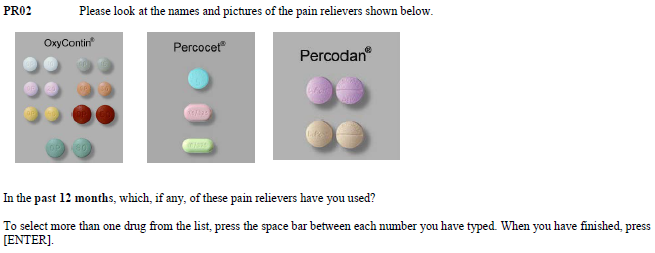
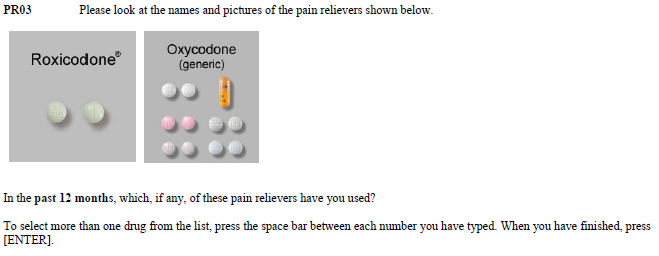
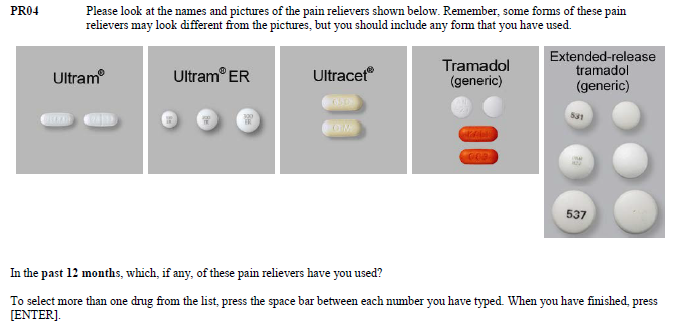
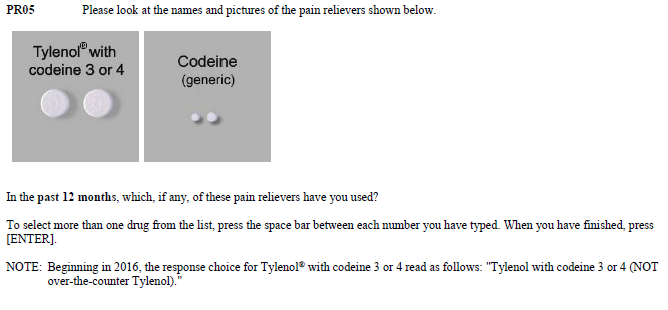
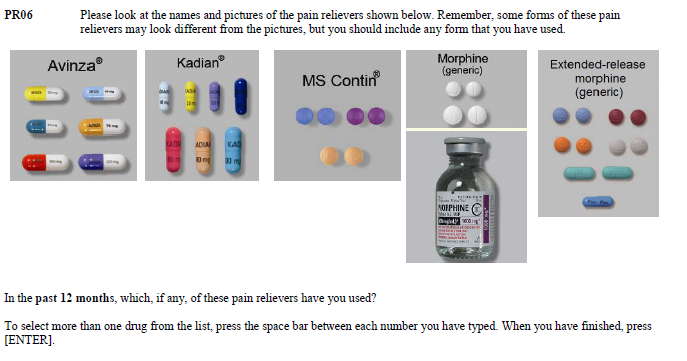
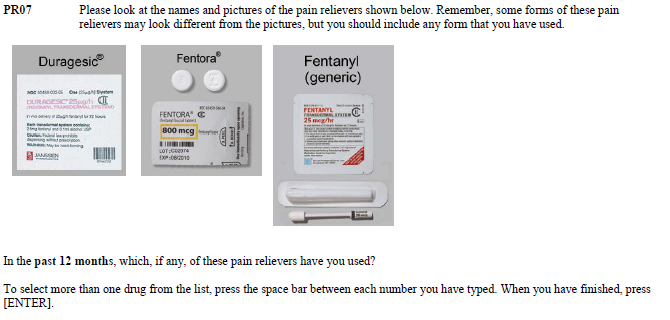

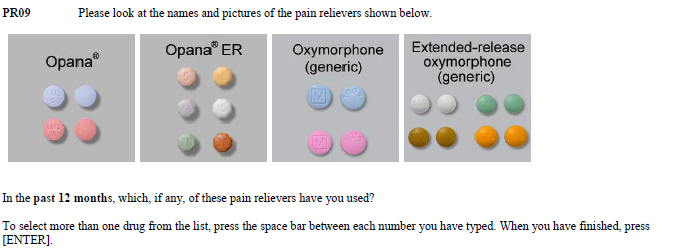

Page
| File Type | application/msword |
| File Title | New Protocol, Request for IRB Review |
| Author | zfk9 |
| Last Modified By | SYSTEM |
| File Modified | 2018-05-02 |
| File Created | 2018-05-02 |
© 2026 OMB.report | Privacy Policy